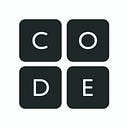A future astrophysicist gets her CS start on Code.org
After schools shutdown last March, this Nebraska 4th grader discovered a love for programming.
Gracie dreams of being an astrophysicist someday, and she’s starting her journey one line of code at a time.
The 4th grade student from Omaha, Nebraska began learning computer science at home using Code.org when her parents started homeschooling her last March after schools abruptly shut down due to the COVID-19 pandemic.
“I like space stuff!” the 10-year-old says, speaking like a true future astrophysicist. “For a final project, I wanted to make a space invader-type game and started building from there.”
Gracie’s game, called “Earth Defenders,” is impressive from a technical standpoint. Built with 369 lines of code, players maneuver a pixelated spaceship around the screen as ominous music plays in the background, using the arrow keys to shoot enemies and move the craft. The goal, of course, is to destroy the alien attackers in under 2 minutes and 19 seconds, which will save the Earth and all its inhabitants.
Gracie worked on her project for nearly two weeks, adding details and making adjustments. “Even after we finished the lesson, I couldn’t stop her. She kept tweaking it,” said her mother, Alicia.
They even wrote to Code.org support with a feature request, which led to a conversation with Mike Harvey, a Curriculum Development Manager at Code.org, who helped Gracie learn how to simplify her code and make the game even better.
Gracie had some exposure to computer science in Kindergarten, but hadn’t studied the subject since. Because Gracie’s school doesn’t currently offer computer science courses, Alicia added the subject to her homeschool curriculum and encouraged Gracie to pursue the subject again given her current career goals. “Based on what her interests are, she needs math and programming — she needs to know her way around computers,” Alicia said. “For now, she likes making games more than doing anything else.”
Alicia has little computer science experience herself, but she’s still able to help Gracie work through lessons in Code.org’s CS Fundamentals curriculum, which is geared toward K-5 students and provides an introduction to foundational computer science concepts.
“I wanted her to know about computer science, and this curriculum is great,” Alicia said of CS Fundamentals. “[Gracie] picked it up quickly, and when she ran into issues, we could figure it out together. But mostly, she worked through it herself.”
Gracie says she enjoys the feeling of accomplishment she gets from finishing a project and seeing it work. Alicia says Gracie might start studying robotics at her middle school when she returns to in-person classes next year, or take up after-school coding classes. And Gracie still continues to make games using Code.org.
“Sometimes it can be hard, but just keep trying,” Gracie says. “Don’t be afraid to try it. If you like it, it’s really fun!”
-Kirsten O’Brien, Code.org
Join us in empowering students like Grace to create their own games by making the most generous gift you can to Code.org. Your support makes Sprite Lab, Game Lab and Code.org’s other learning tools free and accessible to all students around the world. For questions or assistance, please contact the Office of Development at giving@code.org or (206) 593–5521.
